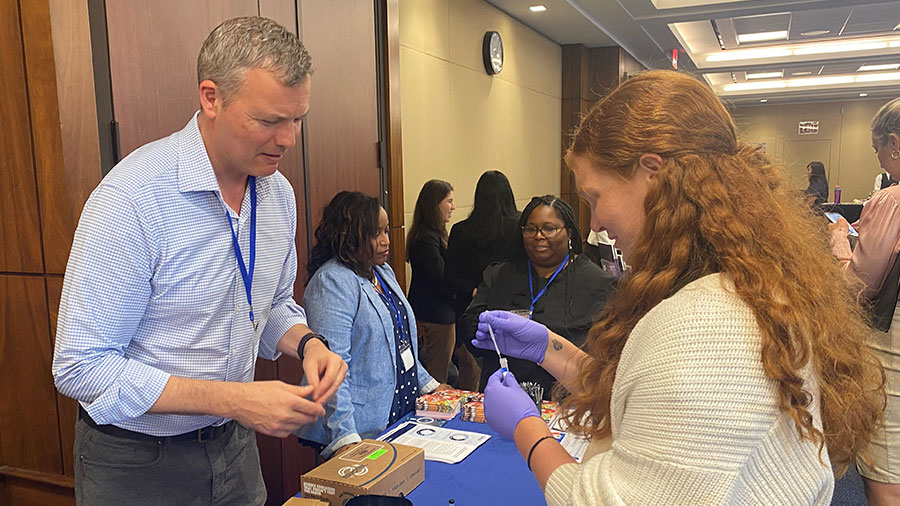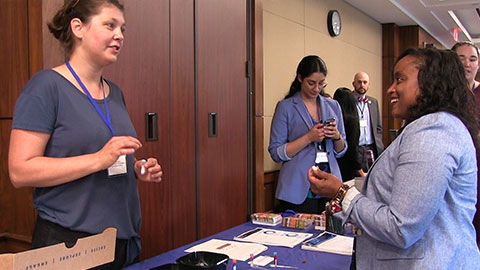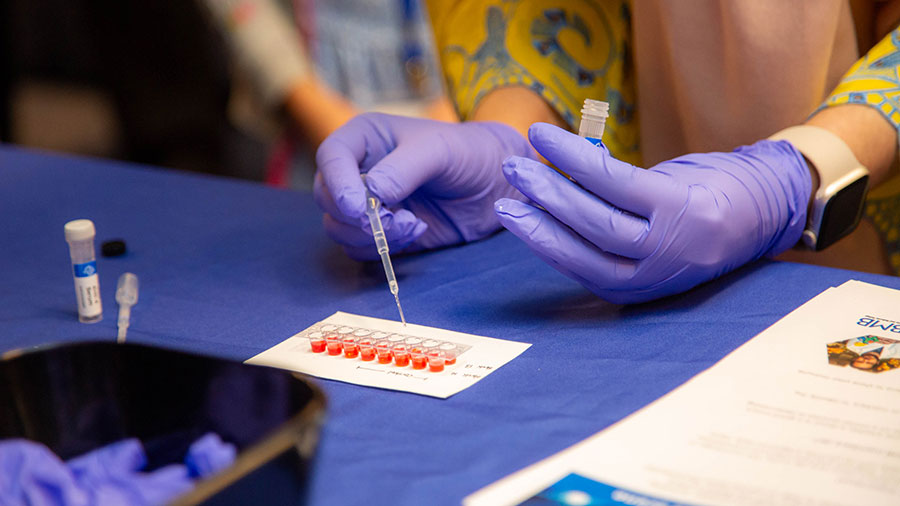Crime scene biochemistry at the Capitol
Last week, American Society for Biochemistry and Molecular Biology committee and staff members participated in the Congressional Life Sciences Fair hosted by the Coalition for Life Sciences and the Federation of American Societies for Experimental Biology on Capitol Hill. The purpose of the event was to give members of Congress and their staffers an opportunity to learn about science and scientific advocacy organizations in a hands-on way. The ASBMB was one of 15 invited organizations that participated in the event; others included the University of Chicago, the American Society of Plant Biologists, the Jackson Laboratory and more.

at the ASBMB booth July 19 at Capitol Hill.
“We wanted to participate in this event to get an audience with congressional staffers,” Sarina Neote, public affairs director of the ASBMB, said. “Their job is to make recommendations on budget increases on programs that need to be supported or programs that need to be cut. Our goal is to convey the importance of basic scientists and how Congress can support us. Then, we hope they inform their boss, whether that's a House rep or senator, what they've learned. Another benefit to making contact with the staffers is that we can establish ourselves as a resource, and a lot of staffers seek out advice from offices like ours on important issues.”


Greg Miller, an ASBMB Science Outreach and Communication Committee member and associate professor of biochemistry at the Catholic University of America, and Shantá D. Hinton, an ASBMB Public Affairs Advisory Committee member and a professor of biology at William & Mary, conducted a forensic science immunoassay demonstration.
“We wanted to show the types of experiments that our community members do but connect it to something that we think about in the real world,” Kirsten Block, director of education, professional development and outreach at the ASBMB, said. “We have all seen crime shows, so this demo is an easy way for people to put themselves in the shoes of a forensic scientist doing these experiments. We can use the activity as a talking point about the types of research that our members do and why it is important.”
The color-changing, texture-changing Edvotek activity simulates a crime scene investigation. Participants use pipettes and an immunoassay to type and identify “blood” samples.
“This event is great because it allows individuals to come in and actually perform an experiment with their own hands and ask questions,” Hinton said. “They can see how the experiment they are performing is used for education. It is a great example of how what scientists do ties into the community.”
The event also gave the ASBMB an opportunity to connect with other advocacy organizations, such as Research America, and undergraduates interested in science.
“It’s important to talk with government officials and staffers because we all have our own bubbles,” Miller said. “Just as my bubble is far away from politics, elected officials’ bubble is pretty far away from biochemistry. So, it's nice to have a space to talk about how our two bubbles actually do overlap.”
Enjoy reading ASBMB Today?
Become a member to receive the print edition four times a year and the digital edition monthly.
Learn moreGet the latest from ASBMB Today
Enter your email address, and we’ll send you a weekly email with recent articles, interviews and more.
Latest in Policy
Policy highlights or most popular articles

Women’s health cannot leave rare diseases behind
A physician living with lymphangioleiomyomatosis and a basic scientist explain why patient-driven, trial-ready research is essential to turning momentum into meaningful progress.

Building a stronger future for research funding
Hear from Eric Gascho of the Coalition for Health Funding about federal public health investments, the value of collaboration and how scientists can help shape the future of research funding.

Councilors advocate for science on Capitol Hill
ASBMB Councilors meet with their elected officials to advocate for basic scientific research funding and training the next generation of scientists.

Hope for a cure hangs on research
Amid drastic proposed cuts to biomedical research, rare disease families like Hailey Adkisson’s fight for survival and hope. Without funding, science can’t “catch up” to help the patients who need it most.

Supporting science through advocacy and community building
ASBMB calls on scientists to take action as funding cuts and policy shifts threaten the U.S. research enterprise, emphasizing the power of community advocacy and persistence in protecting the future of science.

Seven steps to advocating in your home state
Find out how to schedule, prepare for and conduct a productive district office meeting to communicate the importance of fundamental scientific research funding to your representatives.

